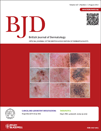Immunoregulatory effects of isotretinoin in patients with acne
Funding sources None.
Conflicts of interest None declared.
The first two authors contributed equally to this article and should be considered as first authors.
Summary
Background In vitro studies have shown that retinoids influence T-cell differentiation.
Objectives To study the effect of isotretinoin on T-cell differentiation markers in patients with acne.
Methods A total of 37 patients with acne vulgaris (25 female, 12 male, age 19·6 ± 3·7 years) and 30 age- and sex-matched healthy controls (19 female, 11 male, age 20·5 ± 4·4 years) were included in the study. Screening for biochemical parameters in serum samples were done just before initiation (pretreatment) and after 3 months of isotretinoin treatment (post-treatment) in the acne group.
Results Baseline levels of tumour necrosis factor (TNF)-α (P < 0·0001), interleukin (IL)-4 (P < 0·0001), IL-17 (P < 0·0001) and interferon (IFN)-γ (P = 0·002) were significantly higher in the acne group compared with the control group. TNF-α (P < 0·0001), IL-4 (P < 0·0001), IL-17 (P < 0·0001) and IFN-γ (P < 0·0001) levels decreased after isotretinoin treatment. TNF-α and IL-4 values after isotretinoin treatment were similar to those of the control group. However, levels of IL-17 (P < 0·0001) after isotretinoin treatment were higher than those of the control group, despite a significant decline after treatment. Levels of IFN-γ (P < 0·0001) after isotretinoin treatment were lower than those of the control group.
Conclusions This study shows that isotretinoin treatment significantly decreases TNF, IL-4, IL-17 and IFN-γ levels in patients with acne. We failed to show that isotretinoin redirects naive T helper (Th) differentiation preferentially towards the Th2 cell lineage.




